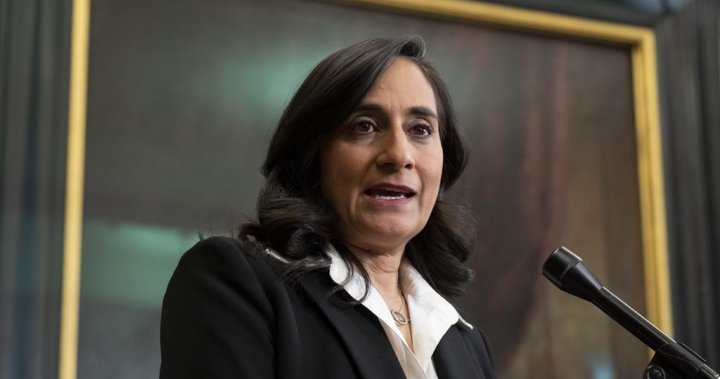Defence Minister Anita Anand announced Friday a proposal to establish an innovation hub in Halifax for the North Atlantic Treaty Organization.
The goal of the hub would be to promote co-operation between NATO’s military members and the technology sector, including tech startups and academic researchers.
Anand says the proposed hub would focus not on building weapons but on emerging technologies, including artificial intelligence, big-data processing, quantum-enabled technologies, biotechnology and novel materials.
Standing on a windswept jetty at the edge of Halifax harbour, Anand said the 30 members of the NATO military alliance are facing increasing technological disruption.
“Strategic competitors are trying to challenge the rules-based international order, which has kept Canada safe since the end of the Second World War,” she said as an icy wind swept across Canadian Forces Base Halifax.
“We can see this through (Russian President) Vladimir Putin’s war on Ukraine and his unjustifiable and illegal invasion of sovereign territory (earlier this year).”
NATO has yet to approve the proposal, but Anand said the hub should be fully operational by 2025.
Admiral Rob Bauer, NATO’s most senior military officer, said the strategic importance of technology is growing.
“It will swing the balance in ensuring a peaceful future,” said Bauer, chairman of NATO’s military committee and a member of the Royal Netherlands Navy.
“One of the reasons that the Ukrainian forces have been successful in pushing back the Russian invasion is their clever use of new technologies.”
The Ukrainian military, for example, has become adept at using small, relatively cheap drones to help them score significant battlefield victories against their Russian adversaries.
“We have all witnessed the critical role of technology companies supporting Ukraine,” Bauer said.
“Help has come both from Ukraine’s own, well-developed tech sector, as well as from big and small international players … Therefore, NATO is redoubling its efforts to stay at the forefront of technology.”
Bauer said NATO is also launching a $1.3-billion venture capital fund that will be supported by 22 of its allies.
“This is not about building new missiles or tanks,” he said. “This is about capturing the power of innovative ecosystems across the alliance.”
If NATO accepts Canada’s proposal, the regional office in Halifax would be part of a NATO network of nine hubs known as the Defence Innovation Accelerator for the North Atlantic, or DIANA.
Anand said the plan is to create a network of innovation sites across North America, and a similar office will be established in London to support a European network.
The minister said Halifax was chosen as the proposed site for a DIANA hub because of its 300 science and technology startups, its seven universities and its large military bases, which include Canada’s Atlantic naval fleet.
This report by The Canadian Press was first published Nov. 18, 2022.
